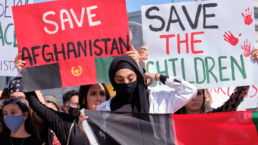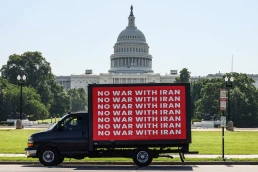The 20-year war in Afghanistan is often spoken of as a well-intentioned failure. In fact, it was a major crime originating in bloodlust and an indifference to Afghan lives. The U.S. bears a major responsibility for the present suffering of Afghans and has an obligation to undo the damage it has inflicted.
By Nathan J. Robinson and Noam Chomsky, Current Affairs
“the oppressed people of Afghanistan will know the generosity of America and our allies.” — George W. Bush, oct. 7, 2001
The 9/11 attacks could have been dealt with as a crime. This would have been sane and consistent with precedent. When lawbreaking occurs, we seek the perpetrators, rather than starting wars with unrelated parties. When the IRA set off bombs in London, nobody called for air strikes on West Belfast (or on Boston, where a great deal of IRA funding came from). When the Oklahoma City bombing was found to have been perpetrated by a white supremacist associated with ultra-right militias, there was no call to obliterate Idaho or Montana. Instead, the attacker was searched for, found, apprehended, brought to court, found guilty, and sentenced.

This was not the approach taken by the Bush administration. Rather than seek out and punish the guilty—and only the guilty—it swiftly launched a “global war on terror” that led to the deaths of millions.1
After the attacks, the Bush administration demanded that the Taliban immediately hand over Osama bin Laden to the United States. The Taliban, in response, offered to put bin Laden on trial, if the United States provided evidence of his guilt. Bush refused. Nor did he consider the Taliban’s offer to give up bin Laden to a neutral third country. His demand, he said, was nonnegotiable. He would not provide the requested evidence (in fact, he had none at the time). He would not enter into talks. Historian Carter Malkasian notes that Bush “did not instruct Powell to open a line to the Taliban to work things out, which would have been the normal diplomatic course of action to avoid a war.”
In fact, long before 9/11, the Taliban had reached out to the United States and offered to put Bin Laden on trial under the supervision of a “neutral international organization,” but the United States government showed no interest and did not respond. Milton Bearden, a CIA station chief who oversaw U.S. covert operations in Afghanistan in the 1980s, told the Washington Post after 9/11 that the Taliban had long been signaling to the United States that they “wanted to get rid of” bin Laden, and probably “set up bin Laden for capture by the United States” but the United States responded to the signals with threats. Relations between the Taliban and bin Laden’s Al Qaeda were, in fact, “deeply contentious,” and the Taliban had repeatedly placed bin Laden under house arrest.
Recent Posts
A War With Iran Would Not Be a One-Off Event But a Disastrous Ongoing Rupture
February 26, 2026
Take Action Now If Congress cedes its power to stop a war with Iran, it will fully erode any lingering promise of democratic restraint.By Hanieh…
New Addition to List of Nuclear Near Catastrophes
February 25, 2026
Take Action Now Debris flew for great distances — many times the distance of 270 meters to a nuclear reactor and nuclear storage facility.By David…
Gavin Newsom’s last budget belies his ‘California for All’ pledge
February 24, 2026
Take Action Now Yet, even as the state is poised to lose billions in federal funding, and millions of Californians are losing access to health care…
Israel and American Hawks are Pushing U.S. to Iran War With Catastrophic Consequences
February 23, 2026
Take Action Now At the World Health Assembly in May, member states may endorse an unprecedented strategy declaring that health is not a cost – but…




